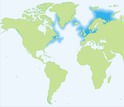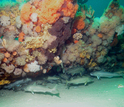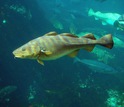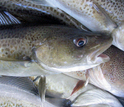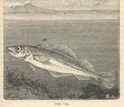News Release 15-135
Warming waters contributed to the collapse of New England's cod fishery
New report shows that warming complicates fisheries management plans
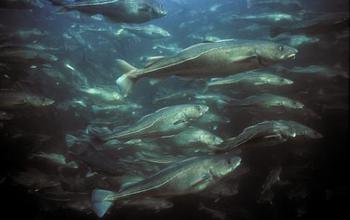
A school of Atlantic cod makes its way along the New England coast.
October 29, 2015
This material is available primarily for archival purposes. Telephone numbers or other contact information may be out of date; please see current contact information at media contacts.
For centuries, cod were the backbone of New England's fisheries and a key species in the Gulf of Maine ecosystem.
Today, cod stocks are on the verge of collapse, hovering at 3-4 percent of sustainable levels. Even painful cuts to the fishery have failed to slow this rapid decline, surprising both fishers and fisheries managers.
Now, a report published this week in the journal Science links the cod collapse directly to rapid warming of ocean waters.
"Here is an explanation for why the Gulf of Maine's cod fishery has not recovered despite significantly reduced fishing," says Mike Sieracki, a program director in the Division of Ocean Sciences at the National Science Foundation (NSF). "Management plans will need to incorporate climate change factors to be effective."
NSF funded the research through its Coastal SEES (Science, Engineering and Education for Sustainability) Program.
Between 2004 and 2013, the Gulf of Maine warmed faster than 99 percent of the global ocean. The rapid warming was linked to changes in the position of the Gulf Stream and to climate oscillations in the Atlantic and Pacific Oceans. These factors added to the steady pace of warming caused by global climate change.
Over the past decade, in the face of quickly declining cod stocks, fisheries managers placed a series of restrictions on harvesting this key Gulf of Maine species. Even strict quota limits on fishers failed to help cod rebound.
"Fishers stayed well within their limits for cod, and yet stocks continued to decline" says Andrew Pershing, chief scientific officer of the Gulf of Maine Research Institute (GMRI) and lead author of the study. "That told us something else was going on--and it turns out that warming was driving the decline."
Pershing and colleagues from GMRI, the University of Maine, Stony Brook University, the Bigelow Laboratory for Ocean Sciences and NOAA's Earth System Research Laboratory found that increasing water temperatures reduced the number of new cod produced by spawning females.
The results also suggest that warming waters led to higher mortality of young fish.
The models used by managers to set quotas for cod did not account for the effects of rising temperatures, leading to quotas that were too high.
Fishers stayed within their quotas but still took more fish than the population could sustain.
"This creates a frustrating situation that contributes to mistrust among fishers, scientists and managers," Pershing says.
According to the report, recovery of Gulf of Maine cod depends on sound fishery management and on knowing water temperature.
Cod is a cold-water species, and the Gulf of Maine is at the edge of its geographic range. As the ocean warms, the capacity of the Gulf of Maine to support cod will decline, leading to a smaller population and a smaller fishery.
The study shows the risk of not including water temperature in fisheries models, especially for stocks like Gulf of Maine cod at the edge of their range.
The warmer climate gets, the less fisheries managers can rely on historical data, Pershing notes.
"The ability to predict the effect of warming on fish stocks will be an important part of adapting fisheries to a changing climate," he says.
The study was also funded by the Lenfest Ocean Program.
-NSF-
-
Atlantic cod are widely distributed on both sides of the north Atlantic Ocean and beyond.
Credit and Larger Version -
Bottom-dwelling fish such as Atlantic cod are often found near structures such as shipwrecks.
Credit and Larger Version -
The once-healthy cod fishery off New England has been affected by ever-warmer waters.
Credit and Larger Version -
A haul of codfish is ready to go to market, then dinner tables.
Credit and Larger Version -
An illustration of an Atlantic cod from the 1876 book "Treasures of the Deep."
Credit and Larger Version
Media Contacts
Cheryl Dybas, NSF, (703) 292-7734, email: cdybas@nsf.gov
Elijah Miller, Gulf of Maine Research Institute, (207) 228-1667, email: emiller@gmri.org
Related Websites
NSF Grant: Coastal SEES (Track 2), Collaborative Research: Resilience and Adaptation of a Coastal Ecological-Economic System in Response to Increasing Temperature: http://www.nsf.gov/awardsearch/showAward?AWD_ID=1325484&HistoricalAwards=false
NSF News: NSF awards $15 million in second set of coastal sustainability grants: http://www.nsf.gov/news/news_summ.jsp?cntn_id=132637
NSF News: NSF awards first coastal sustainability grants for research on world's most populated areas: http://www.nsf.gov/news/news_summ.jsp?cntn_id=129266
Gulf of Maine Research Institute: http://www.gmri.org/
The U.S. National Science Foundation propels the nation forward by advancing fundamental research in all fields of science and engineering. NSF supports research and people by providing facilities, instruments and funding to support their ingenuity and sustain the U.S. as a global leader in research and innovation. With a fiscal year 2023 budget of $9.5 billion, NSF funds reach all 50 states through grants to nearly 2,000 colleges, universities and institutions. Each year, NSF receives more than 40,000 competitive proposals and makes about 11,000 new awards. Those awards include support for cooperative research with industry, Arctic and Antarctic research and operations, and U.S. participation in international scientific efforts.
Connect with us online
NSF website: nsf.gov
NSF News: nsf.gov/news
For News Media: nsf.gov/news/newsroom
Statistics: nsf.gov/statistics/
Awards database: nsf.gov/awardsearch/
Follow us on social
Twitter: twitter.com/NSF
Facebook: facebook.com/US.NSF
Instagram: instagram.com/nsfgov

